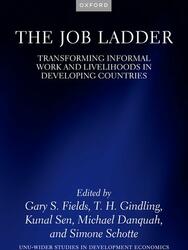Book Chapter
Progress and stagnation in the livelihood of informal workers in an emerging economy
We use long-spanning individual longitudinal data to examine the long-term labour market outcomes of low-tier informal workers in Indonesia. We investigate their characteristics, calculate the extent of switching, and identify the characteristics of those who have switched. Finally, we estimate the earnings premium of switching.
We find that individuals are negatively selected into low-tier informal work. Almost half of individuals who started out as a low-tier informal worker remained as low-tier informal workers through the next 8–19 years. The other half switched on average three times. Most switches take place from low-tier informal to low-tier formal work.
High-tier jobs are relatively closed off to those who started their career as low-tier informal workers. The earnings premium that low-tier informal workers could gain by switching is large and statistically significant. An effective policy, therefore, is to support low-tier informal workers to improve their livelihoods by becoming low-tier formal workers.
 Join the network
Join the network